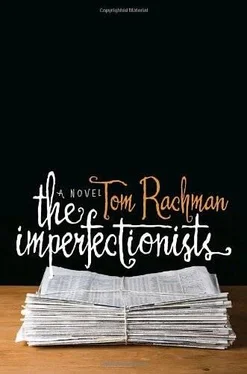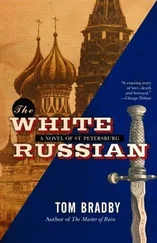"Oh, yeah. It's really interesting," he says. "I have a couple of gripes, but they're pretty minor."
"Like?"
"Nothing serious."
"Tell me one."
"Well, the air is kind of hard to breathe, with all this pollution. Sort of like inhaling from an exhaust pipe. The heat makes me faint sometimes. And the food isn't all that edible. Or maybe I've just been unlucky. Also, it's a police state, which I don't love. And I get the impression the locals want to shoot me. Only when I talk to them, though. Which is my fault-my Arabic is useless. But basically, yeah," he summarizes, "it's really interesting."
"What about Snyder? What do you make of him?"
"You know Snyder?"
"Oh, sure."
"And what do I think of him?" Winston hesitates. "Well, I suppose that, on the surface, I have to admit, he did come off as slightly, uhm, sort of ambitious. But now that I know him better I'm actually starting to think that he's-"
"Even more ambitious."
With unintended candor, he responds, "Sort of a jerk, I was going to say." He wipes his glasses. "Sorry. I'm not offending you, am I?"
"Don't be crazy. He's not a friend of mine," she says. "What are you guys working on, anyway?"
"I'm not even sure. To be fair, before he arrived I wasn't writing a thing. But I was making progress. Or I thought I was. I was getting to know the city, studying my Arabic. I was going to produce something eventually. Then he colonized. He stole my laptop. He has this strange power to trample me and make me feel obligated at the same time. He is encouraging-he's constantly saying I'm a shoo-in for the stringer job, that he has no chance, that I'm the obvious choice, and so forth. Yet the more time I pass with him, the more ridiculous I feel. And I don't understand why a guy with that sort of experience is even trying out for this position."
"Iraq," she explains. "He's trying to get into Iraq. Snyder has been looking for a way in ever since the war started. Did he tell you what he was doing before he came to Cairo?"
"Something about an award?"
"He wrote a blog about Iraq. Or, rather, about trying to get into Iraq. About him getting turned back at the frontier with Iran, with Turkey, with Syria, with Jordan, with Saudi Arabia, with Kuwait. Thank God Iraq has so many borders-it gave him lots of material. I grant him this: he's determined. The guy is more than just a pretty face."
"You consider him pretty?"
"Well, he has that whole gritty war-correspondent thing going. Some women find that sexy," she says. "As far as Iraq goes, his problem is that nobody can figure him out. The Americans don't trust him, the Iranians think he's CIA, the Iraqis are just spooked by the guy. Nobody understands what he's doing there when no publication is sponsoring him."
"And why won't anyone sponsor him?"
"The guy is a handful. He's worked for everybody, then gets into pissing matches, and gets fired," she says. "But forget about Snyder for a moment. Do you have any stories you're doing while he's away?"
"I have some ideas."
"But you haven't filed anything, right?"
"Not yet."
"Good. Look, you don't have a laptop, so come work out of my office," she says. "I want to keep an eye on you."
On Winston's arrival the next morning, Zeina glances up from her computer, fingers still typing. "Gotta take care of this bulletin. Sit. I'll be done in two minutes." She completes it and shakes out her fingers. "Let's go-I'm taking you to your first presser."
But not so fast: Winston has no accreditation to get into a press conference and is stopped at the door of the Arab League. Zeina does her utmost but cannot pull him in with her. Eventually, she sneaks a Palestinian undersecretary out to him. The undersecretary, who speaks English, patiently explains the goings-on inside. Winston scrambles his pen across the page but has never taken down quotes before and finds speech unexpectedly rapid; within three words, the sentence is off and running while his pen straggles behind. Eventually, the undersecretary excuses himself.
"What did you get?" Zeina asks.
Winston studies his notes, which consist of opening phrases-"We believe that…" or "The real problem is…" or "What you must know is…"-followed by unintelligible scrawl.
"A couple of good bits," he replies.
She sets him up at a spare computer in her office and leaves him to write. He is still at it when she goes home for the night. "Call me if you're going to file anything to the paper," she says. "I want to check it first."
But by the next morning he still hasn't finished. In the late afternoon, he finally shows her a draft.
"Well," she says, after a quick read, "it's a start. Definitely a start. I do have a couple of comments."
"Please, go ahead."
"First off, a standard rule for a news article-and I don't mean to mow down your creativity here-is to identify the location and the day at some point. Also, you should cite the names of anyone you talk to. And you might want to avoid using the word 'thing' so much."
"Otherwise it looks okay?"
"Well, this is a test story-let's consider it like that."
"Do you think the paper will want it?"
"It is slightly old by now."
"It happened yesterday morning."
"Which is old in news terms. I'm sorry-I tend to be fairly negative, so don't take my comments too much to heart. But I have to say, you spend way too many words getting to the nut of this story. Also, I felt the undersecretary's goatee received too much attention. Frankly, I wouldn't even mention it."
"I thought it was germane."
"Not in the lead. Don't get me wrong-I like your attempts to insert color. But I felt you were trying too hard at times. Like this bit: 'As he spoke, the yellow Egyptian sun shone very brightly, as if that golden sphere were blazing with the very hope for peace in the Middle East that burned also within the heart of the Palestinian undersecretary for sports, fishing, and wildlife.'"
"I considered deleting that line."
"I'm not even sure it's grammatical. And, for the record, the origins of the Israeli-Palestinian conflict do not 'hark back to an ancient spelling mistake.' Not that I've ever heard."
"I thought that might draw the reader in."
"But it's not true."
"I don't know, Zeina-the undersecretary spoke so fast. And somebody went by selling ice cream. The noise. It distracted me."
"I know-you mention the ice-cream vendor in your article."
"A bit of local color, I thought. So I shouldn't offer it to the paper?"
"Offer it, by all means."
"Or maybe not."
"Look, come back tomorrow. We'll find you another story."
Admittedly, his first attempt flopped. But, as he heads back to the apartment, Winston is electrified-he has conducted a real interview. This was actual journalism. His mobile rings, triggering instant panic: maybe it's Menzies from the paper, demanding stories. No such luck.
"Wassup, bro?"
"Snyder, hi."
"In the Nile Valley. Military commandos. Islamists."
"I'm sorry? I'm hearing only bits of what you're saying. You're coming in telegraphically. Can you repeat that?"
"Aid groupie satphone. Charges by minute. Talk fast. How's research?"
"The stuff you asked me to do? To be completely honest, I haven't had tons of time to work on it. I've sort of been trying to do my own stories. Anyway, it sounds like you're in a rush, so I won't get into the details. Point is I've had difficulty doing the research. In part because you have my laptop."
"Did Kathleen call?"
"No," Winston responds. "Why? Was she supposed to?"
"Halt your story. Do my research."
"She said that?"
"Massive project. Award candidate. In or out?"
"Are you serious?"
"In? Or out?"
Winston settles into a carrel at the American University library. At first, he is irked at having to do Snyder's bidding, but is soon drawn into the material. He cannot deny a certain relief in being able to sift through academic tomes, fulfilling his journalistic duty without having to barge past security guards at the Arab League or grab man-on-the-street from women at the market. This library work is easily his favorite part of reporting so far. Indeed, he grows so engrossed that he's still at it three days later, when Snyder returns to town.
Читать дальше












